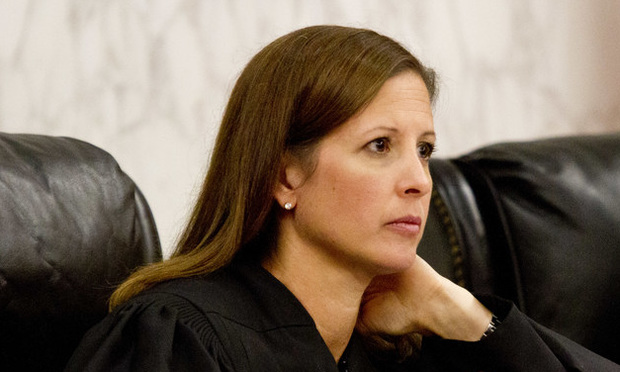Vehicular Homicide Conviction Undone by Another DUI Arrest
“We find the evidence sufficient, but reverse her convictions because the trial court erred by admitting evidence of the subsequent act,” Presiding Judge Sara Doyle said.
October 24, 2018 at 06:24 PM
5 minute read
 Presiding Judge Sara Doyle, Georgia Court of Appeals (Photo: John Disney/ALM)
Presiding Judge Sara Doyle, Georgia Court of Appeals (Photo: John Disney/ALM)
The Georgia Court of Appeals has reversed a hit-and-run vehicular homicide conviction for a woman who ran over her own boyfriend after a night out drinking, saying the trial judge was wrong to let the jury know she had been arrested for driving under the influence again afterward.
“We find the evidence sufficient, but reverse her convictions because the trial court erred by admitting evidence of the subsequent act,” Presiding Judge Sara Doyle said in an opinion released Monday. She was joined by Chief Judge Stephen Dillard and Judge Amanda Mercier.
The decision also undoes a 15-year prison sentence DeKalb County Superior Court Judge Gregory Adams gave defendant Santana Houseworth. Prosecutors charged her with driving under the influence to the extent it was less safe to drive (“DUI less-safe”), hit-and-run and two counts of first-degree vehicular homicide (predicated on felony hit-and-run and DUI less-safe), Doyle said. The jury acquitted her of vehicular homicide based on DUI less-safe but convicted her on the remaining three counts.
District Attorney Sherry Boston said she plans to appeal.
“While we respect the Court's ruling, we are filing a motion for reconsideration,” Boston said in an email Wednesday. “We look forward to the Court's ruling on our pending motion.”
On the winning side are criminal defense attorney Steve Sadow and criminal appeals lawyer Matthew Kyle Winchester.
“We are gratified that the Court of Appeals agreed with our legal analysis that Ms. Houseworth's conviction was unfairly and substantially prejudiced by the introduction of evidence of a subsequent, unrelated and unadjudicated DUI charge,” Sadow said by email Wednesday. “We now look forward to returning to the trial court to resolve the case that stems from the tragic but accidental death of her boyfriend.”
According to the court, on the evening of April 3, 2015, Houseworth went out to a nightclub with her boyfriend, Bobby Gleaton Jr., and several friends. A witness testified that Houseworth drank “three or four shots” and “a couple of cups” of a mixed drink called a “Blue MF,” Doyle said. She and her friends were asked to leave when one of them got into an argument with another patron.
They were in Houseworth's white 2003 Honda Accord. Gleaton was driving at first. But after he and Houseworth got into an argument, he stopped in an office park and got out, saying he would find his own way home. Houseworth drove away, heading east, then made a U-turn and went west toward an interstate at the 45 mph speed limit. Then she and her friend said they “saw something in the road” that could have been a deer. Then they saw it was Gleaton. She swerved and ended up in the median, then recovered control and drove to a parking lot at a nearby restaurant, Doyle said.
Houseworth and her friend got out of the car and saw the bumper was hanging off, the windshield was cracked and the roof was dented. She called her boyfriend's parents and “angrily told them that Bobby” had “messed up her car.” They came to her aid but did not see their son. At about 2:30 a.m., another driver hit Gleaton again. She stopped and called for help, but it was too late. Investigators said they found a broken piece of a bumper for a white Honda Accord, Doyle said.
At about 6:30 a.m., Houseworth called 911 and reported she hit something that may have been a deer. But around 10 a.m., she texted Gleaton's mother to beg forgiveness, saying, “I swear it wasn't intentional,” Doyle said.
More than a year later, in May 2016, after going out drinking to the same bar where she had been the night Gleaton died, Houseworth drove away and hit a building. She was charged with DUI.
Doyle concluded that the admission of information about that arrest at trial prejudiced her.
“The evidence of Houseworth's guilt for vehicular homicide, while sufficient to support her conviction, was not overwhelming,” Doyle said. “The evidence at trial showed that Gleaton stopped and exited Houseworth's car on one side of the four-lane divided highway, and then, in the dark and rain, crossed the highway and the median and was in the road on the other side of the highway—where Houseworth had no reason to expect him to be—when Houseworth's vehicle made contact with him. Under these circumstances, there was not overwhelming evidence that Houseworth caused the accident.”
Doyle said the panel concluded the error could have contributed to the verdict. But she added that the case could be tried again.
The case is Houseworth v. State, No. A18A1105.
This content has been archived. It is available through our partners, LexisNexis® and Bloomberg Law.
To view this content, please continue to their sites.
Not a Lexis Subscriber?
Subscribe Now
Not a Bloomberg Law Subscriber?
Subscribe Now
NOT FOR REPRINT
© 2025 ALM Global, LLC, All Rights Reserved. Request academic re-use from www.copyright.com. All other uses, submit a request to [email protected]. For more information visit Asset & Logo Licensing.
You Might Like
View All
A Plan Is Brewing to Limit Big-Dollar Suits in Georgia—and Lawyers Have Mixed Feelings
10 minute read
On The Move: Kilpatrick Adds West Coast IP Pro, Partners In Six Cities Join Nelson Mullins, Freeman Mathis
6 minute read

Did Ahmaud Arbery's Killers Get Help From Glynn County DA? Jury Hears Clashing Accounts
Trending Stories
Who Got The Work
J. Brugh Lower of Gibbons has entered an appearance for industrial equipment supplier Devco Corporation in a pending trademark infringement lawsuit. The suit, accusing the defendant of selling knock-off Graco products, was filed Dec. 18 in New Jersey District Court by Rivkin Radler on behalf of Graco Inc. and Graco Minnesota. The case, assigned to U.S. District Judge Zahid N. Quraishi, is 3:24-cv-11294, Graco Inc. et al v. Devco Corporation.
Who Got The Work
Rebecca Maller-Stein and Kent A. Yalowitz of Arnold & Porter Kaye Scholer have entered their appearances for Hanaco Venture Capital and its executives, Lior Prosor and David Frankel, in a pending securities lawsuit. The action, filed on Dec. 24 in New York Southern District Court by Zell, Aron & Co. on behalf of Goldeneye Advisors, accuses the defendants of negligently and fraudulently managing the plaintiff's $1 million investment. The case, assigned to U.S. District Judge Vernon S. Broderick, is 1:24-cv-09918, Goldeneye Advisors, LLC v. Hanaco Venture Capital, Ltd. et al.
Who Got The Work
Attorneys from A&O Shearman has stepped in as defense counsel for Toronto-Dominion Bank and other defendants in a pending securities class action. The suit, filed Dec. 11 in New York Southern District Court by Bleichmar Fonti & Auld, accuses the defendants of concealing the bank's 'pervasive' deficiencies in regards to its compliance with the Bank Secrecy Act and the quality of its anti-money laundering controls. The case, assigned to U.S. District Judge Arun Subramanian, is 1:24-cv-09445, Gonzalez v. The Toronto-Dominion Bank et al.
Who Got The Work
Crown Castle International, a Pennsylvania company providing shared communications infrastructure, has turned to Luke D. Wolf of Gordon Rees Scully Mansukhani to fend off a pending breach-of-contract lawsuit. The court action, filed Nov. 25 in Michigan Eastern District Court by Hooper Hathaway PC on behalf of The Town Residences LLC, accuses Crown Castle of failing to transfer approximately $30,000 in utility payments from T-Mobile in breach of a roof-top lease and assignment agreement. The case, assigned to U.S. District Judge Susan K. Declercq, is 2:24-cv-13131, The Town Residences LLC v. T-Mobile US, Inc. et al.
Who Got The Work
Wilfred P. Coronato and Daniel M. Schwartz of McCarter & English have stepped in as defense counsel to Electrolux Home Products Inc. in a pending product liability lawsuit. The court action, filed Nov. 26 in New York Eastern District Court by Poulos Lopiccolo PC and Nagel Rice LLP on behalf of David Stern, alleges that the defendant's refrigerators’ drawers and shelving repeatedly break and fall apart within months after purchase. The case, assigned to U.S. District Judge Joan M. Azrack, is 2:24-cv-08204, Stern v. Electrolux Home Products, Inc.
Featured Firms
Law Offices of Gary Martin Hays & Associates, P.C.
(470) 294-1674
Law Offices of Mark E. Salomone
(857) 444-6468
Smith & Hassler
(713) 739-1250






